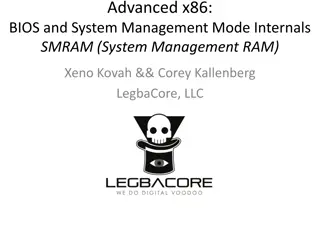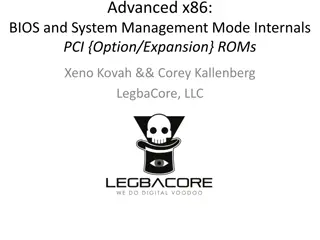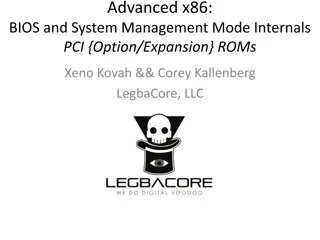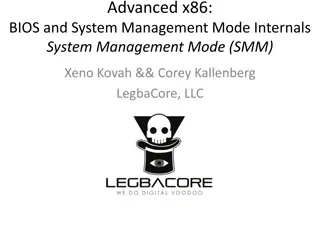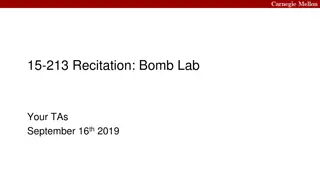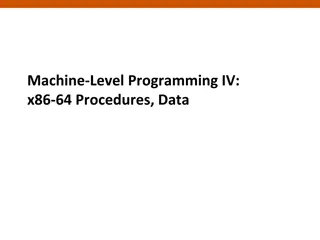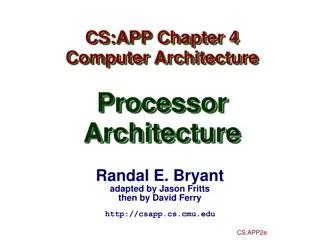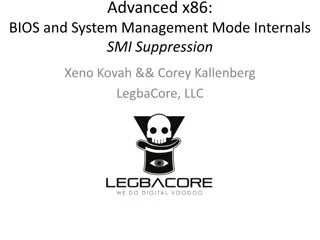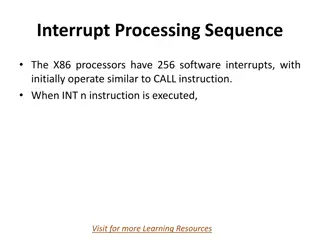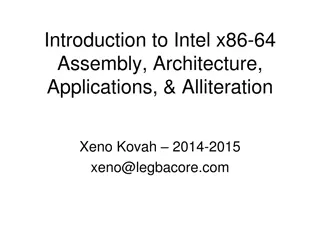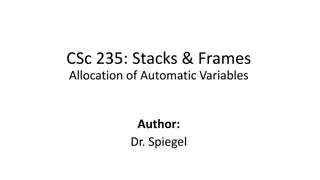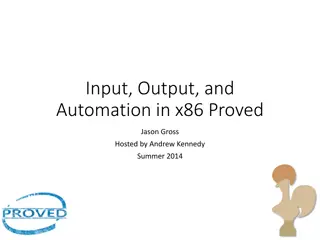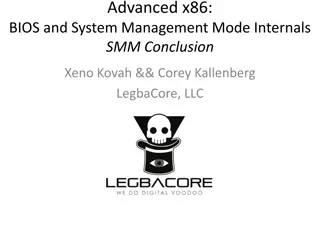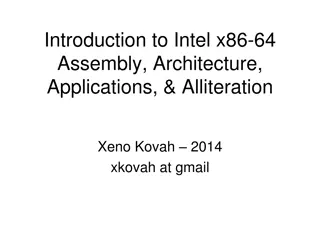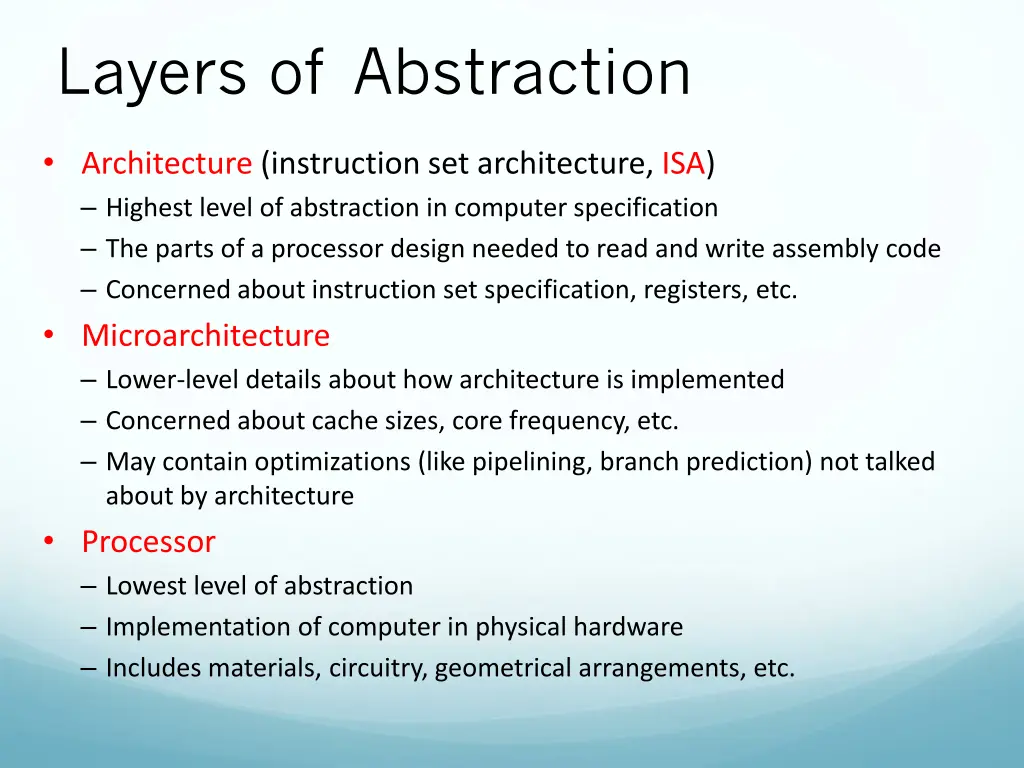
Evolution of Intel x86 Processors
Explore the evolutionary design of Intel x86 processors, starting from the 8086 in 1978 to the multi-core Core i7 in 2008. Delve into the transition from 16-bit to 64-bit architecture, with milestones and improvements highlighted.
Download Presentation

Please find below an Image/Link to download the presentation.
The content on the website is provided AS IS for your information and personal use only. It may not be sold, licensed, or shared on other websites without obtaining consent from the author. If you encounter any issues during the download, it is possible that the publisher has removed the file from their server.
You are allowed to download the files provided on this website for personal or commercial use, subject to the condition that they are used lawfully. All files are the property of their respective owners.
The content on the website is provided AS IS for your information and personal use only. It may not be sold, licensed, or shared on other websites without obtaining consent from the author.
E N D
Presentation Transcript
Layers of Abstraction Architecture (instruction set architecture, ISA) Highest level of abstraction in computer specification The parts of a processor design needed to read and write assembly code Concerned about instruction set specification, registers, etc. Microarchitecture Lower-level details about how architecture is implemented Concerned about cache sizes, core frequency, etc. May contain optimizations (like pipelining, branch prediction) not talked about by architecture Processor Lowest level of abstraction Implementation of computer in physical hardware Includes materials, circuitry, geometrical arrangements, etc.
Architecture Design Strategies CPU Performance formula ???? ???????= RISC (Reduced Instruction Set Computer) Focus on simple instructions that do 1 thing, lowers Fewer instructions, easier to implement, lowers But common patterns repeated in code, raises CISC (Complex Instruction Set Computer) Special instructions for common patterns, lowers ???????????? ??????? (architecture) (microarch.) (processor) ?????? ??????????? ???? ?????? ?????? ??????????? ???? ?????? ???????????? ??????? ???????????? ??????? ?????? Some instructions do many things at once, raises More instructions, harder to implement, raises ??????????? ???? ??????
IA32/x86 Processors Evolutionary Design Started in 1978 with 8086 (based on 8-bit 8008 from 1972) Layered more features on top as time goes on Good: Backwards compatibility, still support ALL old features Ancient machine code still runs on modern processors Bad: Old choices no longer relevant Obsolete features still wasting space in your computer Complex Instruction Set Computer (CISC) Many different instructions with many different formats Hard to match performance of RISC ARM, MIPS But Intel figured out how!
Intel x86 Evolution: Milestones Name Date Transistors MHz 8086 First 16-bit Intel processor. Basis for IBM PC & DOS 1MB address space 1978 29K 5-10 386 First 32-bit Intel processor , referred to as IA32 Added flat addressing , capable of running Unix 1985 275K 16-33 Pentium 4E First 64-bit Intel x86 processor, referred to as x86-64 2004 125M 2800-3800 Core 2 First multi-core Intel processor 2006 291M 1060-3500 Core i7 Four cores (our shark machines) 2008 731M 1700-3900
Intels 64-bit Architecture Tried a radical shift from IA32 to IA64 Totally different architecture (Itanium) Executes IA32 code only as legacy Performance disappointing AMD stepped in with Evolutionary Solution x86-64 (now called AMD64 ) 2004: Intel announced EM64T extension Extended memory 64-bit technology Almost identical to x86-64! Still not supported by OS, programmers
Assembly Programmers View CPU Memory Addresses Object Code Program Data OS Data Registers A L U Data PC Condition Codes Instructions Programmer-Visible State EIP (IA32) or RIP (IA64) Program Counter (PC) Address of next instruction Register File Heavily used program data Condition Codes Store status information about most recent arithmetic operation Used for conditional branching Stack Memory Byte addressable array Code, user data, (some) OS data Includes stack used to support procedures
Assembly Characteristics Minimal Data Types Integer data of 1, 2, or 4 bytes (+ 8 bytes in 64-bit machines) Data values Addresses (untyped pointers) Floating point data of 4, 8, or 10 bytes No aggregate types such as arrays or structures Just contiguously allocated bytes in memory Primitive Operations Perform arithmetic function on register or memory data Transfer data between memory and register Load data from memory into register Store register data into memory Transfer control Unconditional jumps to/from procedures Conditional branches
x86-64 Integer Registers %rax %r8 %eax %r8d %rbx %r9 %ebx %r9d %rcx %r10 %ecx %r10d %rdx %r11 %edx %r11d %rsi %r12 %esi %r12d %rdi %r13 %edi %r13d %r14 %rsp %r14d %esp %rbp %r15 %ebp %r15d Can reference low-order 4 bytes (also low-order 1 & 2 bytes)
Data Formats Word refers to a 16-bit data type (historically) 32-bit: double word / long word 64-bit: quad word In x86-64 code Suffix size (byte) 1 2 4 8 8 4 8 char short int long char * float double byte word double quad quad single prec. s (l) double prec. l (q) b w l q q
Moving Data Moving Data movxSource, Dest: %rax %eax %rbx %ebx %rcx %ecx 1st operand => 2nd operand x refers to the size moved - q = quad word (64 bits) - l = long word (32 bits) - w = word (16 bit) - b = byte (8 bits) %rdx %edx % rax % eax % ax % ah, al %rsi %esi %rdi %edi %rsp %esp %rbp %ebp
Moving Data Operand Types Immediate: Constant integer data Like C constant, but prefixed with $ E.g., $0x400, $-533 Encoded with 1, 2, or 4 bytes Register: One of 16 integer registers (only 8 in 32-bit x86) But %rsp and %rbp reserved for special use Some others have special uses for particular instructions Memory: 8 consecutive bytes of memory Various address modes
movq Operand Combinations Source Dest Src,Dest C Analog li $s0,0x400 movq $0x4,%rax temp = 0x4; Reg Imm movq $-147,(%rax) *p = -147; Mem move $t0, $s0 movq %rax,%rdx temp2 = temp1; Reg Mem movq Reg movq %rax,(%rdx) sw $t0, ($s0) *p = temp; movq (%rax),%rdx lw $t0, ($s0) temp = *p; Mem Reg Cannot do memory-memory transfer with a single instruction
Simple Memory Addressing Modes Direct movq X+8, %rax D Mem[D] Normal (indirect) Register R specifies memory address Pointer dereferencing in C movq (%rcx),%rax (R) Mem[Reg[R]] Displacement (indexed) Register R specifies start of memory region Constant displacement D specifies offset movq 8(%rbp),%rdx D(R) Mem[D+Reg[R]]
Indexed Addressing Modes Most General Form D(Rb,Ri,S) Mem[D + Reg[Rb] + Reg[Ri]*S] D: Constant displacement 1, 2, or 4 bytes Rb: Base register: Any of 8 integer registers Ri: Index register: Any, except for %esp Unlikely you d use %ebp, either S: Scale: 1, 2, 4, or 8 Special Cases (Rb,Ri) Mem[Reg[Rb] + Reg[Ri]] D(Rb,Ri) Mem[D + Reg[Rb] + Reg[Ri]] (,Ri,S) Mem[Reg[Ri]*s]
Address Computation Examples %edx 0xf000 %ecx 0x100 Expression Computation Effective Address 0xf008 0x8(%edx) 0x8 + 0xf000 (%edx,%ecx) 0xf000 + 0x100 0xf100 (%edx,%ecx,4) 0xf000 + 0x100*4 0xf400 0x80(,%edx,2) 0x80 + 0xf000*2 0x1e080
Some Arithmetic Operations Format Two Operand Instructions addq Src,Dest subq Src,Dest imulqSrc,Dest salq Src,Dest sarq Src,Dest shrq Src,Dest xorq Src,Dest andq Src,Dest orq Src,Dest Computation Dest = Dest + Src Dest = Dest Src Dest = Dest * Src Dest = Dest << Src Dest = Dest >> Src Dest = Dest >> Src Dest = Dest ^ Src Dest = Dest & Src Dest = Dest | Src MIPS: sub d,r,s (d=r-s) Also called shlq Arithmetic (MIPS: sra) Logical (MIPS: srl)
Some Arithmetic Operations Format One Operand Instructions incqDest decqDest negqDest notqDest Computation Dest = Dest + 1 Dest = Dest - 1 Dest = -Dest Dest = ~Dest
Addr Computation Instruction leaq Src, Dest Load Effective Address Src is address mode expression Set Dest to address denoted by expression Uses Computing address without the memory reference E.g., translation of p = &x[i]; Similar to MIPS la instruction Can also be (ab)used for computing arithmetic expressions of the form x + k*y k = 1, 2, 4, or 8.
Using leaq for Arithmetic What is the result (stored in %rdx)? leaq (%rdx,%rdx,2),%rdx # %rdx = 3*%rdx movq (%rdx,%rdx,2),%rdx # %rdx = Memory[3*rdx]
Carnegie Mellon Arithmetic Expression Example arith: leaq (%rdi,%rsi), %rax # t1 addq %rdx, %rax # t2 leaq (%rsi,%rsi,2), %rdx salq $4, %rdx # t4 leaq 4(%rdi,%rdx), %rcx # t5 imulq %rcx, %rax # rval ret long arith (long x, long y, long z) { long t1 = x + y; long t2 = z + t1; long t3 = x + 4; long t4 = y * 48; long t5 = t3 + t4; long rval = t2 * t5; return rval; } Register Use(s) %rdi Argument x %rsi Argument y %rdx Argument z %rax t1, t2, rval %rdx t4 %rcx t5
Carnegie Mellon Arithmetic Expression Example long arith (long x, long y, long z) { long t1 = x + y; long t2 = z + t1; long t3 = x + 4; long t4 = y * 48; long t5 = t3 + t4; long rval = t2 * t5; return rval; } x = %rdi; y = %rsi; z = %rdx arith: leaq (%rdi,%rsi), %rax addq %rdx, %rax leaq (%rsi,%rsi,2),%rdx # rdx=3*y salq $4, %rdx # rdx=16*(3*y) leaq 4(%rdi,%rdx), %rcx imulq %rcx, %rax ret Interesting Instructions leaq: address computation salq: shift imulq: multiplication (slow!) But, only used once
Carnegie Mellon Zero/sign extension movzSR s,r Move with zero extension %dl = AA; movzbq %dl, %rax %rax = 0000 0000 0000 00AA movsSR s,r Move with sign extension %dl = AA; movsbq %dl, %rax %rax = FFFF FFFF FFFF FFAA cltq (Convert Long To Quad) sign extend %eax to %rax (only for %eax & %rax)
Example of Simple Addressing Modes void swap (long *xp, long *yp) { long t0 = *xp; long t1 = *yp; *xp = t1; *yp = t0; } swap: movq (%rdi), %rax movq (%rsi), %rdx movq %rdx, (%rdi) movq %rax, (%rsi) ret
Procedure calls in x86 Arguments %rdi, %rsi, %rdx, %rcx, %r8, %r9 Return value %rax Return Address - Stack-based
Swap() Memory Registers void swap (long *xp, long *yp) { long t0 = *xp; long t1 = *yp; *xp = t1; *yp = t0; } %rdi %rsi %rax %rdx Register %rdi %rsi %rax %rdx Value xp yp t0 t1 swap: movq (%rdi), %rax # t0 = *xp movq (%rsi), %rdx # t1 = *yp movq %rdx, (%rdi) # *xp = t1 movq %rax, (%rsi) # *yp = t0 ret
Swap() Memory Registers Address 0x120 123 %rdi 0x120 0x118 %rsi 0x100 0x110 %rax 0x108 %rdx 456 0x100 swap: movq (%rdi), %rax # t0 = *xp movq (%rsi), %rdx # t1 = *yp movq %rdx, (%rdi) # *xp = t1 movq %rax, (%rsi) # *yp = t0 ret
Swap() Memory Registers Address 0x120 123 %rdi 0x120 0x118 %rsi 0x100 0x110 %rax 123 0x108 %rdx 456 0x100 swap: movq (%rdi), %rax # t0 = *xp movq (%rsi), %rdx # t1 = *yp movq %rdx, (%rdi) # *xp = t1 movq %rax, (%rsi) # *yp = t0 ret
Swap() Memory Registers Address 0x120 123 %rdi 0x120 0x118 %rsi 0x100 0x110 %rax 123 0x108 %rdx 456 456 0x100 swap: movq (%rdi), %rax # t0 = *xp movq (%rsi), %rdx # t1 = *yp movq %rdx, (%rdi) # *xp = t1 movq %rax, (%rsi) # *yp = t0 ret
Swap() Memory Registers Address 0x120 456 %rdi 0x120 0x118 %rsi 0x100 0x110 %rax 123 0x108 %rdx 456 456 0x100 swap: movq (%rdi), %rax # t0 = *xp movq (%rsi), %rdx # t1 = *yp movq %rdx, (%rdi) # *xp = t1 movq %rax, (%rsi) # *yp = t0 ret
Swap() Memory Registers Address 0x120 456 %rdi 0x120 0x118 %rsi 0x100 0x110 %rax 123 0x108 %rdx 456 123 0x100 swap: movq (%rdi), %rax # t0 = *xp movq (%rsi), %rdx # t1 = *yp movq %rdx, (%rdi) # *xp = t1 movq %rax, (%rsi) # *yp = t0 ret

